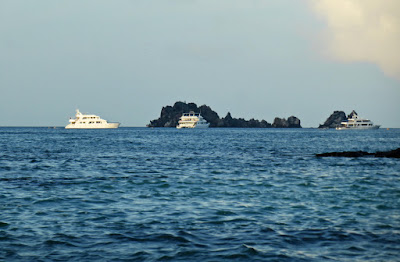Lynn Fowler, the expedition leader, accompanied our beginner group. I enjoyed it and felt a sense of accomplishment, although this was the first time I'd swum in a group. I needed to stick close to Joan, my snorkeling buddy, without bumping into anybody else. One highlight was when Joan spotted a chocolate-chip sea star.
After lunch Lynn gave an absorbing presentation on her graduate study work in the Galapagos. To quote from the Lindblad web site:
Lynn completed a doctorate (also at the University of Florida) in 1983, based on her research of the giant tortoises of Alcedo Volcano on Isabela Island, where she spent a year and a half living on the rim of the crater collecting data.Then the Islander began to sail around Floreana to the site of the first "post office" in the Galapagos. In this photo, taken from the stern, Champion is on the left and Floreana on the right.
It's a wet landing at the post office beach.
Here's the post office. It was established by whalers in 1793; seafarers would deposit letters in the barrel and pick up the ones they could carry onward.
Vanessa explained the history and operation of the post office.
Then all the letters and cards were brought out of the barrel, and the destinations read out by our three naturalists, Vanessa, Christian,
and Jeffo, whose picture hasn't appeared in this blog until now.
There were one or two Ohio-bound pieces, but none close enough for Joan and me to consider hand delivering.
After returning to the Islander there were two activity choices: kayaking and zodiac cruising. Joan and I opted for the zodiacs, but saw some of the kayak operations. Here the kayakers are being helped into their vessels from the embarkation zodiac. (Click on the image to enlarge.)
The kayakers' zodiac kept an eye on things after all the kayaks set out.
This zodiac cruise was the best so far. Early on we approached a beach full of resting sea lions.
The sand must make a great back-scratcher.
Some sea lions were enjoying the surf.
At least one was determined to investigate us.
Sally Lightfoot crabs, and oystercatchers.
Here's a brown pelican.
I love this picture of the snoozing sea lion and the sally lightfoot.
This great blue heron didn't want to pose for me, but instead sat stealthily in the mangrove, where these birds nest.
Two kayakers passed in front of a large mangrove thicket. These salt-tolerant plants have extensive underwater root systems that provide invaluable shelter for young fish and turtles. The extensive nutrients in the brackish water (sea water diluted by freshwater seepage) also encourage bird nesting. The endemic and endangered Galapagos penguins of Isabela island depend on mangroves.
This clump shows that the tide is in.
Kayaks as well as zodiacs must take the channels between rocky islets.
Other tour boats are at anchor here, but we seem to own this patch. The Islander does have the 2pm-6pm slot.
A visit from another Islander zodiac.
Rick shares our zodiac, and he's having a great time too.
Sunset comes quickly at the equator -- the sun doesn't approach the horizon at an angle, but drops straight down.
It's time for everybody to return to the Islander and the evening program.
Not to mention dinner!
I love this picture of the snoozing sea lion and the sally lightfoot.
This great blue heron didn't want to pose for me, but instead sat stealthily in the mangrove, where these birds nest.
Two kayakers passed in front of a large mangrove thicket. These salt-tolerant plants have extensive underwater root systems that provide invaluable shelter for young fish and turtles. The extensive nutrients in the brackish water (sea water diluted by freshwater seepage) also encourage bird nesting. The endemic and endangered Galapagos penguins of Isabela island depend on mangroves.
This clump shows that the tide is in.
Kayaks as well as zodiacs must take the channels between rocky islets.
Other tour boats are at anchor here, but we seem to own this patch. The Islander does have the 2pm-6pm slot.
A visit from another Islander zodiac.
Rick shares our zodiac, and he's having a great time too.
Sunset comes quickly at the equator -- the sun doesn't approach the horizon at an angle, but drops straight down.
It's time for everybody to return to the Islander and the evening program.
Not to mention dinner!

























No comments:
Post a Comment
Comments may not appear immediately as they are moderated by the author to eliminate spam. Please, no commercial links!